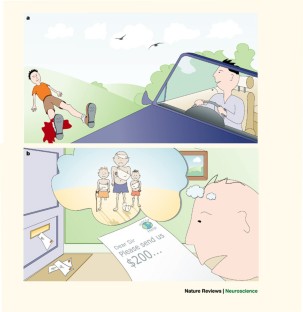From neural 'is' to moral 'ought': what are the moral implications of neuroscientific moral psychology? (original) (raw)
- Opinion
- Published: 01 October 2003
Nature Reviews Neuroscience volume 4, pages 846–850 (2003)Cite this article
- 5239 Accesses
- 196 Citations
- 5 Altmetric
- Metrics details
Abstract
Many moral philosophers regard scientific research as irrelevant to their work because science deals with what is the case, whereas ethics deals with what ought to be. Some ethicists question this is/ought distinction, arguing that science and normative ethics are continuous and that ethics might someday be regarded as a natural social science. I agree with traditional ethicists that there is a sharp and crucial distinction between the 'is' of science and the 'ought' of ethics, but maintain nonetheless that science, and neuroscience in particular, can have profound ethical implications by providing us with information that will prompt us to re-evaluate our moral values and our conceptions of morality.
This is a preview of subscription content, access via your institution
Access options
Subscribe to this journal
Receive 12 print issues and online access
$189.00 per year
only $15.75 per issue
Buy this article
- Purchase on SpringerLink
- Instant access to full article PDF
Prices may be subject to local taxes which are calculated during checkout
Additional access options:
Figure 1: Moral dilemmas and contradictions.

Similar content being viewed by others
References
- Doris, J. M. & Stich, S. P. in The Oxford Handbook of Contemporary Analytic Philosophy (eds Jackson, F. & Smith, M.) (Oxford Univ. Press, New York, 2003).
Google Scholar - Hume, D. A Treatise of Human Nature (eds Selby-Bigge, L. A. & Nidditch, P. H.) (Clarendon, Oxford, 1739/1978).
Google Scholar - Moore, G. E. Principia Ethica (Cambridge University Press, Cambridge, 1903/1959).
Google Scholar - Spencer, H. Data of Ethics (Kessinger, Belle Fourche, 1883/1998).
Google Scholar - Sturgeon, N. L. in Essays on Moral Realism (ed. Sayre-McCord, G.) 229–255 (Ithaca, Cornell University Press, 1988).
Google Scholar - Darwall, S., Gibbard, A. & Railton, P. Toward a fin de siecle ethics: some trends. Philos. Rev. 101, 115–189 (1992).
Article Google Scholar - Casebeer, W. D. Moral cognition and its neural constituents. Nature Rev. Neurosci. 4, 841–847 (2003).
Article Google Scholar - Aristotle . Nicomachean Ethics (translated by Irwin, T.) (Hackett, Indianapolis, 1985).
Google Scholar - Kant, I. Groundwork of the Metaphysic of Morals (translated by Patton, H. J.) (Harper and Row, New York, 1785/1964).
Google Scholar - Mill, J. S. Utilitarianism (ed. Crisp, R.) (Oxford Univ. Press, New York, 1861/1998).
Google Scholar - Haidt, J. The emotional dog and its rational tail: a social intuitionist approach to moral judgment. Psychol. Rev. 108, 814–834 (2001).
Article CAS Google Scholar - Unger, P. Living High and Letting Die: Our Illusion of Innocence (Oxford Univ. Press, New York, 1996).
Book Google Scholar - Singer, P. Famine, affluence, and morality. Philos. Public Affairs 1, 229–243 (1972).
Google Scholar - Greene, J. D., Sommerville, R. B., Nystrom, L. E., Darley, J. M. & Cohen, J. D. An fMRI investigation of emotional engagement in moral judgment. Science 293, 2105–2108 (2001).
Article CAS Google Scholar - Sober, E. & Wilson, D. S. Unto Others: The Evolution and Psychology of Unselfish Behavior (Harvard Univ. Press, Cambridge, Massachusetts, 1998).
Google Scholar - Harman, G. The Nature of Morality (Oxford Univ. Press, New York, 1977).
Google Scholar - Greene, J. D. The Terrible, Horrible, No Good, Very Bad Truth About Morality and What to Do About It. Ph.D. Thesis, Princeton University (2002).
Google Scholar
Acknowledgements
Many thanks to W. Casebeer, A. Herberlein and L. Nystrom for their valuable comments.
Author information
Authors and Affiliations
- the Department of Psychology and the Center for the Study of Brain, Mind, and Behavior, Princeton University, Princeton, 08544, New Jersey, USA
Joshua Greene
Authors
- Joshua Greene
You can also search for this author inPubMed Google Scholar
Rights and permissions
About this article
Cite this article
Greene, J. From neural 'is' to moral 'ought': what are the moral implications of neuroscientific moral psychology?.Nat Rev Neurosci 4, 846–850 (2003). https://doi.org/10.1038/nrn1224
- Issue Date: 01 October 2003
- DOI: https://doi.org/10.1038/nrn1224